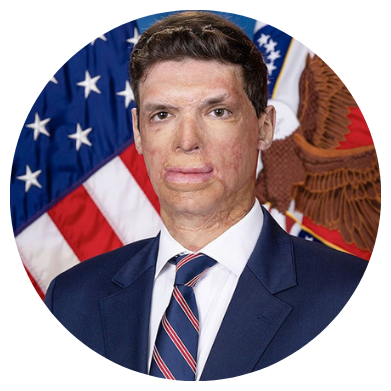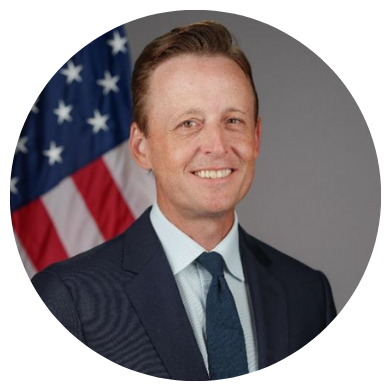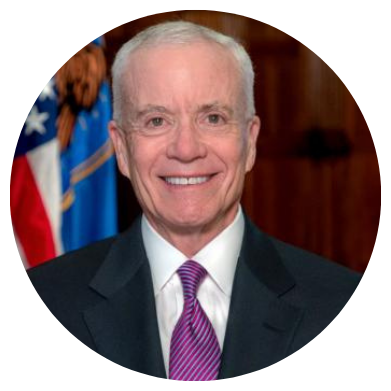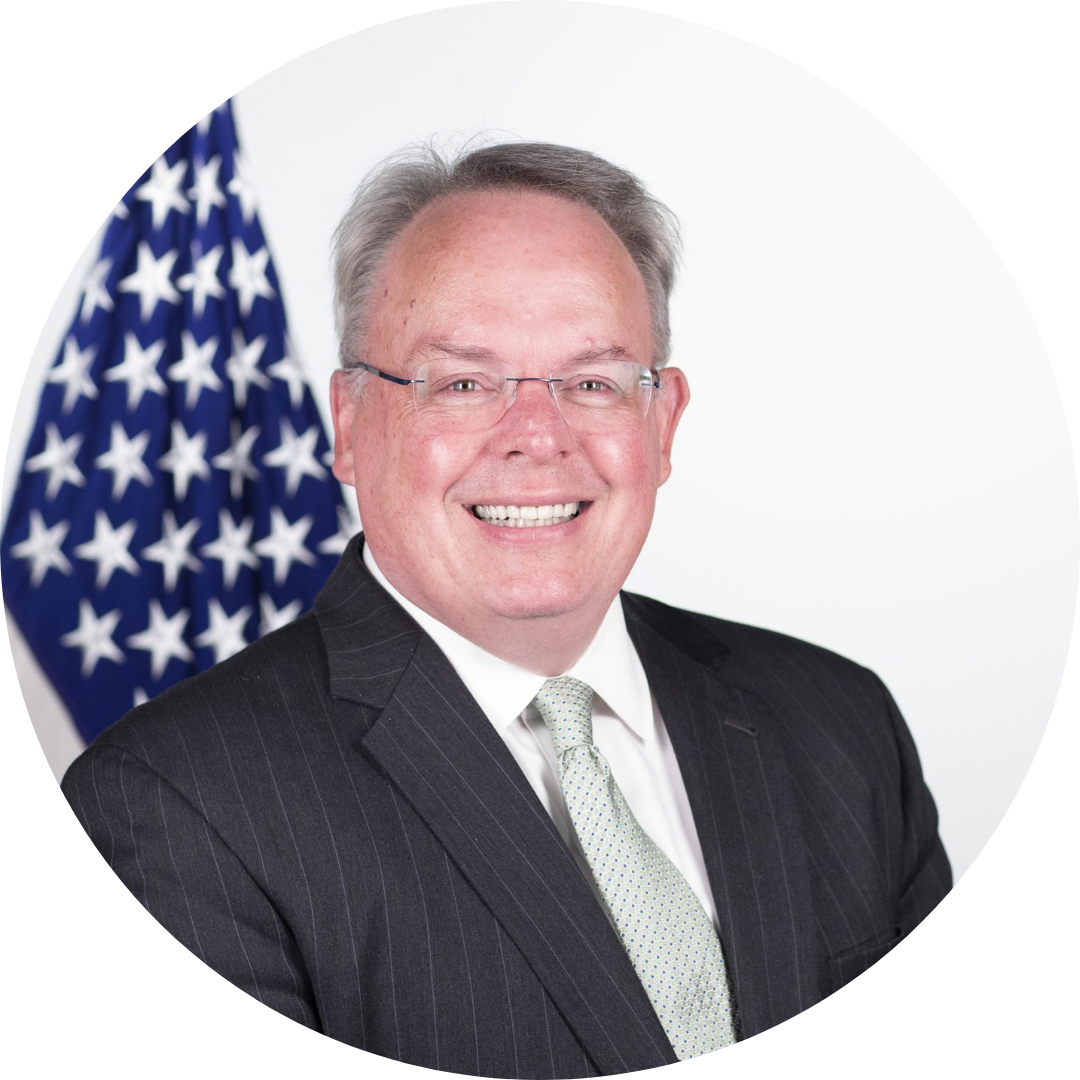Speakers
.png)

The Honorable Samuel B. Brown was nominated by President Donald J. Trump and confirmed by the Senate on July 30, 2025, to serve as the 8th Under Secretary for Memorial Affairs at the U.S. Department of Veterans Affairs. In this role, he oversees the operation and maintenance of 157 VA national cemeteries and the delivery of memorial products such as headstones, markers, medallions, and Presidential Memorial Certificates. He also administers the federal grant program supporting the establishment and expansion of Veterans cemeteries managed by states, territories, and tribal governments. His responsibilities further include leading programs that honor and preserve the memory of Veterans through the Veterans Legacy Program and the Veterans Legacy Memorial.
Prior to this appointment, Under Secretary Brown served as a Senior Advisor to Secretary Collins, supporting strategic initiatives and special projects. Drawing upon his military service, personal experience as a recipient of VA health care and benefits, and prior work as a VA contractor, he provided informed counsel across a broad range of departmental issues.
Before joining VA, Mr. Brown led efforts to advocate for a change in national leadership and priorities aimed at benefiting all Americans. Prior to this, and shortly after earning his MBA from Southern Methodist University, he founded and served as CEO of Palisade Strategies. The company supported Veterans by providing urgent and emergency pharmaceutical access and services within local communities on behalf of VA. Under his leadership, Palisade expanded from serving a single VA region to offering services nationwide, including the U.S. Pacific Islands. Mr. Brown sold the company in 2021, enabling its continued impact on behalf of Veterans.
Mr. Brown began his military career in 2006 after commissioning as an Infantry Officer from the United States Military Academy at West Point. An Airborne Ranger-qualified leader, he led soldiers from the 1st Infantry Division in combat operations during Operation Enduring Freedom in Kandahar, Afghanistan, in 2008. He was severely wounded during this deployment, resulting in his medical retirement at the rank of Captain. His awards include the Combat Infantryman Badge, Bronze Star, Purple Heart, and Army Commendation Medal with “V” device for valor.

Sean Cairncross was confirmed as the National Cyber Director by the United States Senate on August 2, 2025, and joins the White House as President Trump’s principal advisor on national cybersecurity policy and strategy.
Before leading the Office of the National Cyber Director, Mr. Cairncross served as the Chief Operating Officer for the Republican National Committee, overseeing operations during both the 2024 and 2016 presidential cycles.
In 2019, he was appointed by President Trump and confirmed by the U.S. Senate as the Chief Executive Officer of the Millennium Challenge Corporation. Prior to this appointment, he served as Deputy Assistant to the President and Senior Advisor to the White House Chief of Staff.
Previously, Mr. Cairncross was a partner at a nationally recognized election law firm. He has also served as Deputy Executive Director and General Counsel to the National Republican Senatorial Committee under Senator John Cornyn (R-TX) from 2009 to 2013 and as RNC Chief Counsel from 2007 to 2009.
Mr. Cairncross began his career at Covington & Burling and holds a J.D. from the NYU School of Law, an M.Phil. from Cambridge University, and a B.A., summa cum laude, from American University.


Edward C. Forst is the 24th Administrator of the U.S. General Services Administration. He oversees about 8,000 people who handle the federal government’s buildings, purchasing, and technology.
Before being nominated by President Donald J. Trump, Ed spent more than 40 years in finance, real estate, academia, government, and senior management. He ran large organizations, made tough calls in difficult markets, kept costs under control, and invested with discipline. Over time, he came to believe that clear accountability, efficiency, and strong risk management are what drive results.
Ed was a General Partner at Goldman Sachs and served on the firm’s Management Committee. Working out of New York and London, he was Co-CEO of Goldman, Sachs & Co. Asset Management, which managed over $1 trillion at the time. He also served as the firm’s Chief Administrative Officer, overseeing operations, real estate, risk, and technology, and chaired the Global Capital Commitments Committee. He sat on the board of GS Bank and was Chairman of the Securities Industry and Financial Markets Association.
During the financial crisis, Ed left Goldman, Sachs & Co. to help his alma mater, Harvard University, serving as Executive Vice President and Principal Operating Officer. Reporting directly to the university president, he oversaw finance, operations, and real estate, and served on the board of the Harvard Management Company, which manages the university’s endowment. During this period, he also worked with the U.S. Treasury Department as an advisor on the creation of the Troubled Asset Relief Program.
After retiring from Goldman Sachs in 2011, Ed continued in leadership and investment roles. He served as President and CEO of Cushman & Wakefield, running the global commercial real estate firm across more than 60 countries and leading its sale for its private-equity owner. He later became Chairman and a member of the Investment Committee at Lion Capital, a London-based private equity firm that has invested more than $8 billion in consumer brands.

An award-winning CEO and management consultant, Fran has established a lengthy track record of nearly 3 decades as a business leader, keynote speaker, and technology innovator. Fran founded Aerobodies, Inc. founded in 1997, as a provider of health management and business consulting services to private and public sector organizations and has developed several proprietary health technologies in the healthcare industry. Today, Aerobodies is an Inc. 5000 award winning firm, serving over 11 million employees in over five countries, including the Veterans Administration, DOD, HHS, USDA and several civilian agencies.
Fran is a graduate of George Mason University and a certified Executive Leadership Coach through Georgetown University's School of Professional Studies. She’s has served on multiple boards now including the Professional Services Council.

John Heller is the Chief Executive Officer (CEO) and a member of the board of directors of Amentum, a global leader in advanced engineering and technology solutions to the U.S. federal government and allies. His responsibilities include planning and administering the company strategy and directing the operating activities for all 53,000 employees in approximately 80 countries around the world. Under John’s leadership, Amentum has become a global leader in advanced engineering and innovative technology solutions, trusted by the United States and its allies to address their most significant and complex challenges in science, security and sustainability.
Prior to leading the transformative Amentum-Jacobs’ Critical Mission Solutions business merger, John was the chief executive officer of the legacy Amentum company. Under his leadership, he integrated two multi-billion-dollar acquisitions and transformed Amentum into an industry-leading provider of engineering, system integration, and project management services to the U.S. government and partners.
Before his role at Amentum, John served as chief executive officer and president at PAE and led its efforts to become publicly traded. Prior to that, he served as senior vice president and chief operating officer of Engility Corporation after the company was spun off from L-3 Communications. John also held several leadership positions at Harris Corporation, including president of Harris IT Services, and served as CEO of Netco, Inc., a Cerberus Capital Management portfolio company, eventually overseeing its sale to Harris Corp.
John started his career in the U.S. Army serving in various leadership positions as a logistics officer. He then attended graduate business school and joined Deloitte Consulting. Following a decade in the consulting field, John attained his first CEO position at Rentport, Inc., a portfolio company of Catterton Partners (now L Catterton), a venture capital and private equity firm.
John graduated from the U.S. Military Academy at West Point and earned a master’s degree in business administration from the University of Pittsburgh. Today, he serves on the University of Pittsburgh Councellor’s Advisory Council and on the Pitt Business Board of Visitors, an advisory board to the Dean of the Joseph M. Katz Graduate School of Business and College of Business Administration. In recognition of his achievements and contributions in the field of business, John was also named the university’s Katz Graduate School Distinguished Alumni Honoree.
As a leader in the government services industry, John also serves as the Vice-chair for the Professional Services Council board of directors and executive committee. He is a well-recognized leader in the government contracting industry being awarded 2024 CEO of the Year by WashingtonExec and 2024 Association for Corporate Growth CEO of the Year. He has been in the Washington100 list of top executives multiple times over his career.

Mark Lee is a recognized leader in government services with extensive experience building and leading businesses at the intersection of science, engineering, and technology. Prior to joining ERT, he served as Chief Technology Executive for ICF, a publicly traded global consulting and technology services company. In this role, Mark drove the company’s overall technology strategy and implementation through his leadership of ICF’s client-facing technology business and the company’s Chief Technology Officer function. Mark’s team provided technology, digital solutions, and advanced data and analytics tools to help clients deliver practical programs that lead to positive outcomes in areas such as health, environment, climate, energy, and disaster recovery.
Mark previously served as the executive vice president of ICF’s public sector business and spent over 25 years with the firm. During his time leading ICF’s public sector business, he led the development and implementation of the strategy used to rapidly expand ICF’s technology footprint, largely through three strategic acquisitions. Through these efforts, ICF grew its technology business from $50M to over $500M in under three years.
Mark currently serves on the board of directors for the Professional Services Council (PSC) and the Public Health Foundation at the University of North Carolina’s Gillings School of Global Public Health. He was also recognized by WashingtonExec as a Top Space Exec to Watch in 2025 and a Top Public Sector Leader to Watch in 2020 and 2021.
Mark holds a Master of Science and a Bachelor of Science in Public Health from the University of North Carolina at Chapel Hill.

Kevin Robinson has served as President and CEO of MTSI since 2013 and as a member of the MTSI Board of Directors since 2004. Kevin’s focus on strategy, leadership, innovation, and the customer has resulted in aggressive growth for this innovative, technology-focused, 100% employee-owned company.
Joining MTSI in 1997 as employee number eight, he was instrumental in shaping and developing the current $800M business with 2500 employees and a diverse portfolio of over 150 services and solutions contracts. The company has grown organically from $100M to $800M since Kevin took over as President and CEO. In addition to financial growth, MTSI has sustained an award winning, unique “employee-centric” culture with a highly engaged workforce. Prior to his position as President and CEO, Kevin served as Vice President of Strategic Development. In this role, he was the driving force in tripling the size of the company from 2008 to 2013 by leading the development of differentiated capabilities across the company’s core service lines and creating an integrated pursuit, capture, and proposal system for new business development. His ability to drive dynamic growth was quickly apparent in his first position with the company, where he founded and grew the company’s largest business unit delivering rapid acquisition, engineering and technology services to multiple Department of Defense, Intelligence Community, NASA, and Department of Homeland Security customers.
Kevin has 35+ years’ experience leading and managing diverse teams of contractor and Government representatives. For most of his career, he worked to provide expertise to clients in areas ranging from technology development and insertion to capability development, test and evaluation, and force integration. He is a recognized national expert in missile defense systems and technologies.
Kevin has won numerous awards for exceptional customer service in engineering and test leadership roles including being the first recipient of the Missile Defense Agency ‘Contractor of the Year’ award in 2004.
Before joining MTSI, Kevin worked at GRCI (now AT&T) for 10 years where he had a significant role in leading requirements development, analysis, and designs for advanced unmanned vehicles, EO/IR and RF sensors, advanced fire control, directed energy weapons, and lightweight kinetic interceptor capabilities. Kevin is a graduate of Rensselaer Polytechnic Institute (RPI) with a BS degree in aeronautical engineering.

The Hon. Jim Carroll became Chief Executive Officer (CEO) of the Professional Services Council (PSC) on May 19, 2025.
As CEO, Jim is responsible for advocating for the interests of companies that provide cutting-edge solutions and services to the government. Under his leadership, PSC is shaping public policy, leading strategic coalitions, and establishing communications between government and industry — all with a focus on best outcomes and results for the government and the American taxpayers.
Carroll brings over 30 years of relevant government and industry experience, including service across multiple federal departments and agencies, and a Fortune 25 corporation. He has been appointed by two U.S. Presidents to senior positions and was unanimously confirmed by the Senate.
Jim is widely recognized as a trusted leader with a well-documented track record of bipartisan collaboration and strategic policy influence. He is an active member of the Bipartisan Policy Center, a Washington-based think tank that fosters cross-party dialogue and develops pragmatic policy solutions to address national challenges.
Prior to joining PSC, Jim Carroll was a Partner at the law firm Frost Brown Todd (FBT) in Washington, D.C., and served as a Principal at CivicPoint, FBT’s public affairs subsidiary. He advised clients on a wide range of government enforcement and compliance matters, from internal reviews to high-profile investigations.
From 2018-2021, Jim served as Director of the Office of National Drug Control Policy (ONDCP), leading efforts to address the national opioid crisis. Under his leadership, the United States recorded its first year-over-year decrease in overdose deaths in three decades. He oversaw the coordination of a $35 billion annual budget across 16 federal agencies.
A seasoned policy strategist, Jim Carroll has testified before Congress multiple times, successfully securing funding and driving policy advancements in areas such as public health, law enforcement, and federal procurement. He is widely respected for his ability to navigate complex legal frameworks and government regulatory issues.
Carroll’s deep relationships with senior decision-makers across federal agencies, the White House, and Capitol Hill uniquely position him to help influence and shape policies. His ability to foster bipartisan dialogue and deliver meaningful results has been consistently demonstrated throughout his career.
From 2016 to 2018, Jim held several high-profile roles at the White House, including Principal Deputy Chief of Staff, Deputy White House Counsel, and General Counsel of the U.S. Office of Management and Budget. Earlier in his career, during the George W. Bush Administration, Jim held various senior roles, including Associate Counsel and Special Assistant to the President before becoming the Deputy General Counsel and Acting General Counsel of the U.S. Department of Treasury. He also held key positions within the U.S. Department of Justice’s Office of Legal Policy and the Executive Office for United States Attorneys.
In the private sector, Carroll spent a decade with the Ford Motor Company, where he served as Washington Counsel and Global Director of Compliance. Under his leadership, Ford was recognized by the Ethisphere Institute as one of the “World’s Most Ethical Companies” for three consecutive years. He also served as General Counsel for the Ford Motor Company Fund, the company’s philanthropic arm. A team builder and servant leader, Jim is known for cultivating high-performing teams that prioritize stakeholder needs and deliver results.

Stephanie Kostro became President of the Professional Services Council (PSC) on June 11, 2025, where she guides PSC’s strategic direction, advocacy, and member engagement efforts across growing federal industry priorities.
Previously, she served as Executive Vice President for Policy, leading PSC's policy team in its commitment to advocating for and supporting productive collaboration between the federal government and services industry. As a recognized executive, on-air commentator, and policy expert with more than 20 years of experience in the U.S. Government and industry, she brings a wealth of knowledge in federal procurement policy and acquisition regulations, government processes and programs, and public-private partnerships.
Prior to joining PSC in 2021, Kostro was a Principal at a government relations and consulting firm where she developed and implemented policy, funding, and business development strategies for a global client base. She worked extensively with civilian, defense, diplomatic, and intelligence officials, as well as with federal departments’ oversight committees in Congress.
From 2010-2015, she was a senior fellow and director of the Homeland Security and Counterterrorism Program at the Center for Strategic and International Studies, a prominent national security think tank. Kostro served as a State Department contractor at U.S. Embassy Baghdad for one year, and from 2005-2008, she was a senior professional staff member and policy director on the House of Representatives Armed Services Committee. At the Pentagon from 1998-2005, she worked in a variety of offices within the Office of the Secretary of Defense, on the Joint Staff, and in embassies and missions overseas.


